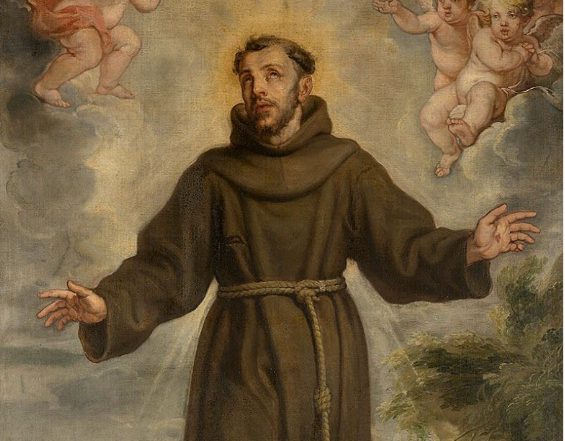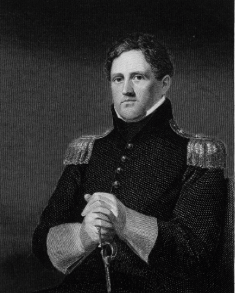Winner of the Spring 2019 StMU History Media Award for
Best Article in the Category of “People”
Francis was faced with a very large obstacle: while he was trying his hardest to pursue what he found to be his vocation, the hate that welled up in his father proved to be a major issue in his passage to that calling. Even though Francis knew without a doubt that he could easily become a very successful merchant, he felt an even stronger gravitation towards another life. Indeed, he felt called to a life that would constantly require to him to put the skills he gained from shadowing in his father’s work and provide him with an even stronger fulfillment in his life, despite it being very much against the social standards of his community and the wishes of his father. While his father saw his choice as an acceptance of failure, Francis saw it as an answer to the call of something greater than anyone could have ever imagined.
In Assisi, Italy, lived our character, Francis. Francis was born in 1182 to Pietro and Pica Bernardone. Throughout his childhood, Francis proved to be a very charming and popular young boy, as he was well liked by many children in his area, and was constantly followed by a group of friends. At home, Francis’ parents were very caring for him and constantly tended to all his wants and needs. His father was a very successful textile merchant, a career that made him and his family wealthy, while Francis’ mother stayed at home with him and did house work, including serving Francis, making him the center of her life, her pride and joy.1 Francis was well set with a large group of friends and two parents that loved to spoil him.2 When Francis was of age, he went to work with his father to learn the business of a merchant. Francis, as it turned out, was a natural, and caught on to the trade very well. After a short time, he began showing signs of a bright future as a textile merchant.
Merchants in Francis’ time were those that traveled long distances in order to exchange goods in various lands with various people. Textile merchants, the kind of merchant that Francis’ father was, tended to sell a great amount of goods and generally made very large amounts of revenue from their sales. Merchants were also well known for influencing the spread of culture and religion to those that they sold to, as they needed to be very persuasive in order to make sales, and were naturally found to do the same with their lifestyles. As a result, Francis quickly learned not only how to sell goods, but how to teach as well. The skill of spreading and teaching customs, language, and especially religion would greatly influence Francis’ future. His father had no idea that he was preparing his son for a future calling outside of textile trading.3
When Francis reached young adulthood, a war had sparked in his country, Assisi, and its neighboring city, Perugia. Francis was sent into the military to take part. On the battlefield, Francis observed firsthand the many horrors of battle, and was left with experiences that would haunt him for quite some time. Francis was not in a good mental state when he was sent home from his first tour, and sadly, he hardly had time to recover before he was sent to war a second time. The next time he came home, Francis’ behavior had taken a turn for the worst, as his memories had scarred him greatly. To attempt to rid himself of these scars, Francis tried to return to the life he had right before he first left home. In an attempt to adapt to civilian life, Francis ultimately found himself drinking heavily with his friends and was frequently surrounded by constant celebrations. In addition to his attempts to fuel his social life, he continued to live the life of good luxury in his home. All of his attempts, however, only numbed the pain for a very short time.4
Not long after returning to life in his town, Francis had fallen gravely ill. Eventually, when his state failed to improve, it seemed very likely that he would die from the illness that had caught hold of him. Francis was surrounded by distress and fear, and it seemed to him that there was nowhere to turn. With nowhere else to seek refuge, Francis began to turn towards his faith, which he had neglected through his life of luxury and celebration. He began to visit the local church daily to reflect and pray. He found a very strong devotion to Christ’s Passion, through the Stations of the Cross. This was a small conversion that would continue to influence Francis. After turning his face towards the church, Francis found himself healing from his great illness. In response, he began to devote more and more time to his spirituality within the church: he reflected daily on Christ’s Passion through the Stations of the Cross. His illness quickly forgotten, Christianity became the most important matter in Francis’ life. Unbeknownst to his community or himself, Francis was changing.5
His parents were the first to see the changes that Francis was going through, though they knew not what was going on in his life. All they noticed was that his mood, all of a sudden, had become withdrawn from others. After a while, they noticed that Francis was acting out of the ordinary, very unlike what they had always known him to be. Then, all together, without any warning, Francis simply left. Francis’ parents had no idea where he had gone or what he was up to.6
Francis had left his old life behind and began a new one. He took a vow of poverty. He no longer held a longing to have many material possessions or a large accumulation of wealth, things he was raised with. Instead, he began to focus all of his energy on teaching and preaching to others, using his skills that he had drawn from his merchant work with his father. He found that he loved to talk with his fellow brothers and sisters, and he wanted to bring them to a life dedicated to Christ. He even preached when there were no humans to preach to. Francis was known to preach to birds and other animals. He called them, too, his brothers and sisters, for he considered them to be part of God’s gifts in creation. This is the side of Francis that many Catholics would know him for as a saint, hundreds of years in the future.

Although Francis had found a path that he was truly happy to follow, his father did not share this same view. Francis’ father viewed his son’s decision as an embarrassment, since he had been raised in a place of high status. His father felt that Francis had thrown away everything that was handed to him, and tainted the family name. Soon, the frustrations of Francis’ father turned to hate and hostility, and Francis was no longer welcomed home. Despite all this, Francis continued on the path he vowed to follow.7
Despite the unfortunate circumstance with his father, Francis continued on his path of asceticism and growth of himself and others in Christ. The nature of his work ensured that Francis would travel to many areas, another lifestyle that he had grown accustomed to from his work as a merchant. Everywhere he went, he preached and began to accumulate followers. Pretty soon, Francis became a popular figurehead and was beloved by many, just as he had been as a boy. This time, however, it was by his work, not his wealth and social status, that he gained such immense popularity.
Francis saw that he had a large congregation of followers that loved his ways, so he decided to go to the Holy Father to establish a religious order after his teachings. He went with his most loyal followers and presented his request to Pope Innocent III. The order was denied at first, but after much convincing from Francis, Innocent III agreed and declared the order. Upon hearing this, Francis’ followers were overjoyed. Francis and his newly vowed religious brothers began to take on new assignments in order to guide others to Christ.8

Francis gave up everything in order to pursue his vocation in life. He abandoned the wealth and luxury that was readily available to him, and dedicated himself to a life that was so much more. Francis fought through the attitudes of his community and family alike, and stood by the life that he believed to be prosperous, going so far as to create an order that stands strong today. After his death, Francis was canonized on July 26, 1228, by Pope Gregory the IX. St. Francis is today one of the most beloved saints in the Catholic church and is often remembered for his many works and dedication to Christ and his people.9

- Paul Sabatier, The Road to Assisi (Massachusetts: Paraclete Press, 2003), 17-18. ↵
- Augustine Thompson, O.P., Francis of Assisi: A New Biography (New York: Cornell University Press, 2012), 8-9. ↵
- Paul Sabatier, The Road to Assisi (Massachusetts: Paraclete Press, 2003), 15-17. ↵
- Paul Sabatier, The Road to Assisi (Massachusetts: Paraclete Press, 2003), 19-20. ↵
- Augustine Thompson, O.P., Francis of Assisi: A New Biography (New York: Cornell University Press, 2012), 13. ↵
- Augustine Thompson, O.P., Francis of Assisi: A New Biography (New York: Cornell University Press, 2012), 14. ↵
- Paul Sabatier, The Road to Assisi (Massachusetts: Paraclete Press, 2003), 46-56. ↵
- Paul Sabatier, The Road to Assisi (Massachusetts: Paraclete Press, 2003), 64-67. ↵
- Paul Sabatier, The Road to Assisi (Massachusetts: Paraclete Press, 2003), 172. ↵



101 comments
Azucena Cuevas
St. Francis lived an awfully great life with all that one can wish for. It is remarkable the power of will and devotion to God he had to leave everything behind. It is admirable that with all fortune readily available he chose his faith and started a new life of “poverty.” He was so committed and all his preaching helped him become one of the most important Saints in the Catholic church/community.
Paul Garza
Amazing article that explores the life of the famous saint Francis before he converted. Growing up in a catholic family I always heard about different saints and great people, however St. Francis seemed to be the most talked about in the church, but I never heard of his life before he converted. Big credits to st. Francis who was able to drop everything he had, all the riches and materialistic things in his world to live a humbled life. I honestly couldn’t do that, sad to say but I don’t think most of us could leave anywhere without our phones.
Michael Lazcano
When I think the monastic order, and being a true disciple of Jesus Christs’ teaching of spreading the good news, one of the first names that comes to mind is Saint Francis of Assisi. The tale of Saint Francis is something that would be considered crazy today In this materialistic society, he gave up his wealth and riches to pursue God, and heaven. His family was what was holding him back from his vocation, and like it says in the bible he cut off what was causing him to sin. He went against his family to do what he thought was right, which takes courage especially in a vocation of uncertainty.
Sabrina Doyon
Saint Francis of Assisi was an inspirational man. He was dying but was saved through prayer and turned his whole life around to thank the Lord for what he had given him. He truly earned his title and worked hard to spread the word of the lord and life a life of poverty to understand those who were poor and come to understand life as well. He was a great man and he lives on in our history.
Jose Chaman
The history of Saint Francis of Assisi is exemplary. After his illness, he received the grace of the Lord, not many of us are so blessed. Following his example, in these days is very difficult and I cannot imagine all the willpower he had to have, which is why I especially respect and admire this saint. Thanks to this article I was able to immerse myself more in the history before his conversion. Excellent article.
Vanessa Quetzeri
I never heard the story behind St. Francis of Assisi, but I’m glad I have now. After he soon recovered from his illness he became determined and forever thankful to the Lord no matter what his family thought of him. It is amazing to think that a man who was once the center of celebrations, could change so drastically: eventually becoming canonized.
Margaret Maguire
I knew a little bit about St. Francis before reading this article because of my faith. I know he is the patron saint of animals and the environment. I didn’t really know about his past. I didn’t know that his family was not supportive in his vocation. He also only got deep into his faith because of a terrible illness he got while trying to cope with being in the military twice. I also learned that he is the patron saint of animals because he would preach to anything included the animals of the forest.
Todd Brauckmiller
I can’t even imagine the amount of commitment one must have to give up ones social status just so you can help others. That’s the kind of people you don’t see very often, ignoring his wealth to help those in need is an act of kindness. Sadly, he didn’t get his dads support on this, kind of reminds me in today’s age when kids end up doing something that their parents don’t agree with. Like instead of going to college some people go straight into work (which i’m not saying is a bad idea), it’s just that some parents would not agree to the idea. Our parents want whats best for us but sometimes parent and child don’t see eye to eye most times.
Patricia Arechiga
It is unfortunate that many allow the power and ‘status’ money brings to them drive them away from their vocation. Often many people feel the need to follow a particular lifestyle that directs them to a life that may sustain joy, but not true happiness. It is unfortunate that St. Francis had to develop a form of depression after the war in order to face a religion that was before him his entire life. However, we often face trials in order to find our true calling. St. Francis had the courage to leave the lifestyle of wealth to follow what felt right, something that the world needs to learn how to do.
Amanda Quiroz
What a great article about Saint Francis of Assisi and the vow of poverty he made. He set aside what he had, regardless of his father’s views, to help others find and follow what they’re passionate in. It takes a strong person to follow your heart and not care about what others will say about it.